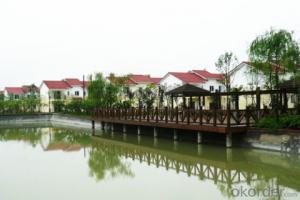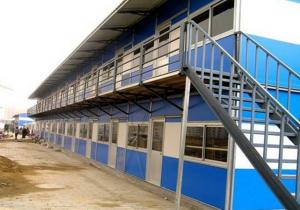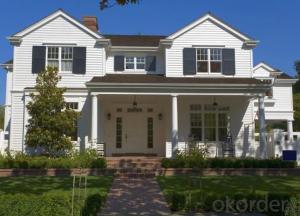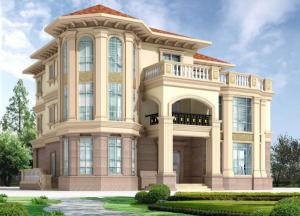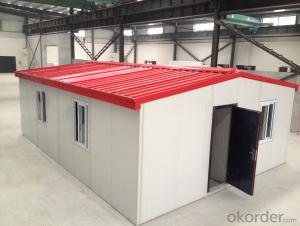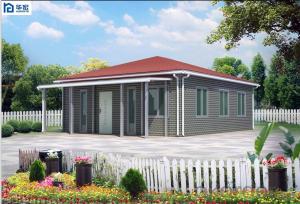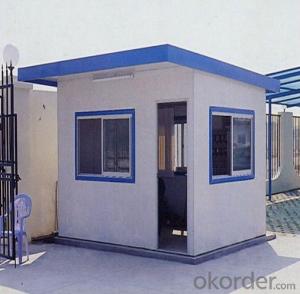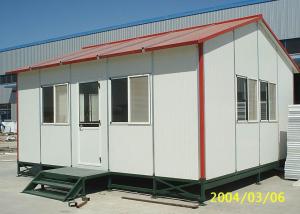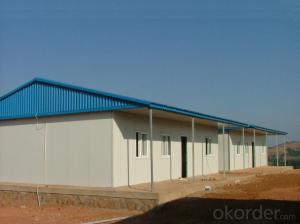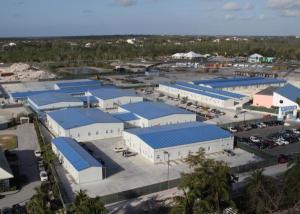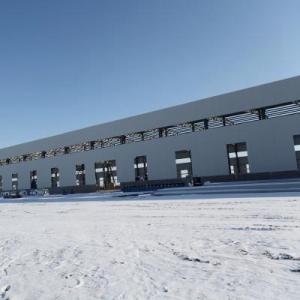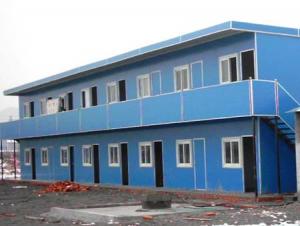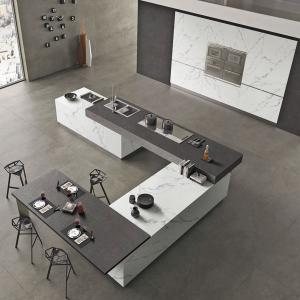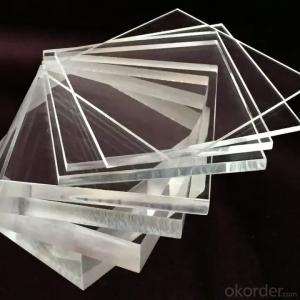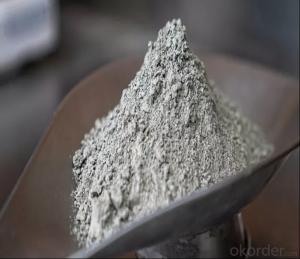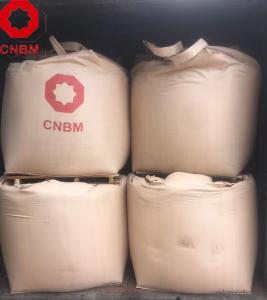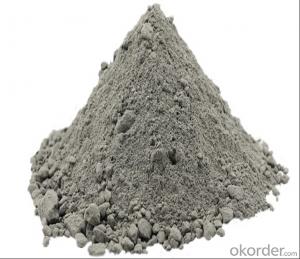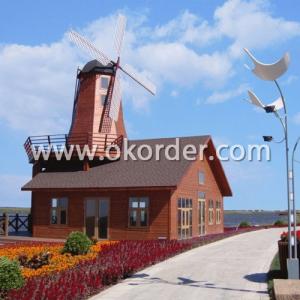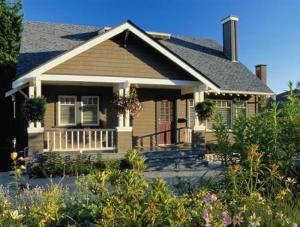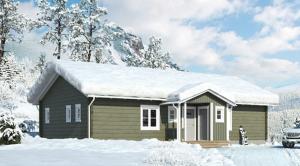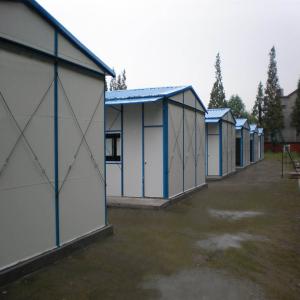Light gauge steel house
- Loading Port:
- China Main Port
- Payment Terms:
- TT OR LC
- Min Order Qty:
- -
- Supply Capability:
- -
OKorder Service Pledge
Quality Product, Order Online Tracking, Timely Delivery
OKorder Financial Service
Credit Rating, Credit Services, Credit Purchasing
You Might Also Like
The adavantages of the light gauge steel villa:
1. Better thermal insulation
The advanced exterior overall thermal insulation meets the updated state energy-saving standards for buildings. It refrains from the cold and thermal bridges phenomenon, and keeps buildings away from damages such as dampness, distortion, mildew and corrosion.
The unique heat reflection and ventilation layer design can make better insulation effects. Temperature can be reduced by five to eight degrees. ( In my opinion, this advantage is very suitable for the climatic condition of Middle East )
2. Seismic and Wind Resistance
Withstand the shock of 9 on the Richter scale. The dense light gauge steel and column are connected in flexible method with screws and bolts, which can abosorb the energy of eathquake. There are fittings between foundation and wall, which are resistant to pull out and shear. The total weight of the house is light, which is only 1/6 of the conventional concrete houses. Therefore it has better anti-seismic performance.
Can endure typhoon of 12 levels
There are special fittings among roof, floor, wall and foundation. The strong connection can help resist typhoon of 12 levels.
3. Roof Load-bearing and Fireproof
The structure can be designed according to climate requirements.
Wall and floor slab use special technology which can meet 3h refractory limit.
4. Sound insulation
Improved technology on sound insulation and shock absorption meet the state building standards for sound insulation. Special methods are performed, especially towards the audio frequency ranging from 250-1000Hz which is the most sensitive to ears, in order to create a quiet and comfortable living environment.
5. Moisture-proof and Ventilation
There is a gap between wall and roof truss, so the air can flow inside.
There is one-way ventilation layer in the composite wall, which is able to make the wall "breath". This means moisture can be reduced inside the door.
6. Durable (90 years structure safty guarantee)
Special coating technology enables the structural materials to have the self-restoration function to prevent rust and corrosion.
Envelope materials using new light weight building materials to achieve fire resistant, anti-corrosion and anto-moth.
7. Energy Efficient and Enviromental Protection
Energy Saving: 65-90 energy redution.
Water Saving: The dry construction consumes 10% of water used in traditional constrution.
Land Saving: The inside usable area increases 10%
Environment Protection: Pollution-free construction system.
- Q:Are container houses suitable for eco-resorts?
- Yes, container houses are suitable for eco-resorts. These houses are made from recycled shipping containers, which aligns with the eco-friendly concept of resorts. They can be easily modified to incorporate sustainable features such as solar panels, rainwater harvesting systems, and energy-efficient insulation. Container houses also have a minimal carbon footprint as they reduce the need for new construction materials. Additionally, their versatile design allows for creative and unique architectural solutions, enhancing the eco-resort experience for guests.
- Q:Are container houses suitable for remote work or home office setups?
- Yes, container houses can be suitable for remote work or home office setups. Container houses are versatile and can be customized to suit individual needs and preferences. They provide a unique and stylish option for creating a comfortable and functional workspace. One of the key advantages of container houses is their portability. They can easily be transported to remote or off-grid locations, making them ideal for those seeking a peaceful and secluded work environment. Furthermore, their compact size ensures that they can be set up quickly and easily, saving time and effort. Container houses can also be modified to include all the necessary amenities for a productive home office setup. They can be equipped with electricity, heating, and cooling systems, as well as insulation to ensure a comfortable working environment in any climate. Additionally, they can be designed with ample natural light and ventilation, which are essential for enhancing productivity and well-being. Moreover, container houses can be customized to fit specific work requirements. They can be designed with multiple rooms or partitions, allowing for separate workspaces or meeting areas. Additionally, they can be expanded or connected to create a larger office space if needed. In terms of cost, container houses are generally more affordable compared to traditional construction methods. They offer a cost-effective solution for those looking to set up a remote work or home office space without breaking the bank. Additionally, container houses are eco-friendly, as they are repurposed from shipping containers, contributing to sustainability efforts. Overall, container houses are a suitable option for remote work or home office setups. They provide flexibility, portability, customization options, and cost-effectiveness, making them a practical and efficient choice for individuals looking to create a comfortable and productive workspace in remote locations.
- Q:Can container houses be financed through mortgages?
- Yes, container houses can be financed through mortgages. Just like traditional houses, container houses can be considered real property and thus qualify for mortgage financing. However, the availability of mortgage options may vary depending on the specific circumstances, location, and lender's policies. It is advisable to consult with lenders or mortgage brokers who specialize in alternative housing options to explore the financing possibilities for container houses.
- Q:Are container houses resistant to mold and mildew?
- Yes, container houses can be resistant to mold and mildew if proper insulation, ventilation, and moisture control measures are implemented during construction.
- Q:Are container houses suitable for temporary housing?
- Certainly, container houses are a suitable option for temporary housing. These houses, constructed from repurposed shipping containers, offer an innovative and cost-effective solution for temporary housing requirements. They possess qualities such as durability, portability, and easy availability. Temporary housing projects can greatly benefit from container houses due to their quick and simple assembly. This feature makes them ideal for emergency situations or areas with urgent housing needs. The containers can be swiftly transported and set up on-site, allowing for the rapid accommodation of displaced individuals or communities. Moreover, container houses provide the advantage of customization. They can be designed to meet specific requirements, accommodating basic amenities like insulation, electricity, plumbing, and heating/cooling systems. This ensures a comfortable living environment. Additionally, containers can be stacked or arranged in different configurations, enabling the creation of larger living spaces or the accommodation of multiple families. Another advantage of container houses is their affordability. When compared to traditional building materials, shipping containers are relatively inexpensive. This makes them a cost-effective solution for temporary housing projects. Furthermore, the use of repurposed containers is environmentally friendly, as it reduces waste and promotes recycling. Container houses also offer the advantage of mobility. They can be easily relocated to different sites, allowing for flexibility in responding to changing needs or situations. This quality is particularly beneficial for temporary housing projects requiring mobility, such as disaster relief efforts or construction site accommodations. To conclude, container houses are highly suitable for temporary housing. Their durability, portability, customization options, affordability, and mobility make them an excellent choice for emergency housing, disaster relief, construction site accommodations, and other temporary housing needs.
- Q:How to do a good job Warehouse Invoicing?
- Improve the warehouse management system to do a good job of warehouse management is very important to implement the warehouse management regulations for the basis of warehouse management work is very important.
- Q:Can container houses be built with a rainwater collection system?
- Yes, container houses can be built with a rainwater collection system. In fact, their modular design makes it easier to integrate such systems into the structure. Rainwater can be collected from the roof of the container house and stored in tanks, barrels, or other containers for later use in household chores, gardening, or even as a source of drinking water after proper filtration and treatment.
- Q:Are container houses prone to leaks or water damage?
- When container houses are designed and constructed properly, they generally do not experience leaks or water damage. By ensuring adequate insulation and sealing, container houses can effectively keep water out. However, it is important to remember that the quality of materials and workmanship also play a significant role in preventing leaks and water damage, just like in any other type of construction. If a container is not sealed properly or has structural issues like rust or corrosion, it can potentially lead to leaks or water infiltration. To maintain the integrity of a container house and prevent water-related issues, regular maintenance and inspections are crucial. Additionally, directing water away from the foundation through proper drainage and landscaping around the house can reduce the risk of water damage. Overall, with careful planning, appropriate construction techniques, and regular maintenance, container houses can be just as resistant to leaks and water damage as traditional houses.
- Q:Can container houses be designed to have a laundry room?
- Yes, container houses can definitely be designed to have a laundry room. The interior layout and design of container houses can be customized to accommodate various functional spaces, including a dedicated area for laundry. By strategically planning the placement of plumbing, electrical connections, and appliances within the container, it is entirely feasible to integrate a laundry room into the design.
- Q:Can container houses be designed with a rainwater harvesting system?
- Yes, container houses can definitely be designed with a rainwater harvesting system. In fact, container houses are known for their adaptability and sustainability, making them an ideal choice for incorporating such eco-friendly systems. Rainwater harvesting systems collect and store rainwater that falls on the roof, which can then be used for various purposes such as irrigation, flushing toilets, or even for drinking water after proper treatment. These systems typically consist of gutters and downspouts to channel the rainwater into a storage tank or reservoir. When designing a container house with a rainwater harvesting system, several factors need to be considered. Firstly, the roof design should be optimized to efficiently collect rainwater, such as using sloping roofs or installing additional catchment areas. Secondly, the size of the storage tank should be determined based on the water demands of the house and the average rainfall in the area. Container houses offer great flexibility in terms of placement and customization. Therefore, the rainwater harvesting system can be integrated into the design from the beginning, ensuring seamless integration and optimal functionality. For example, the storage tank can be placed underneath the container house or adjacent to it, depending on the available space and structural considerations. It is important to note that proper filtration and purification systems should be installed to ensure the collected rainwater is safe for its intended use. Additionally, regular maintenance and cleaning of the system are crucial to prevent any contamination or blockages. Overall, container houses provide a great opportunity to incorporate rainwater harvesting systems, promoting sustainability and reducing reliance on traditional water sources. With proper design and implementation, container houses can effectively collect and utilize rainwater, contributing to a more eco-friendly and self-sufficient living environment.
1. Manufacturer Overview |
|
|---|---|
| Location | |
| Year Established | |
| Annual Output Value | |
| Main Markets | |
| Company Certifications | |
2. Manufacturer Certificates |
|
|---|---|
| a) Certification Name | |
| Range | |
| Reference | |
| Validity Period | |
3. Manufacturer Capability |
|
|---|---|
| a)Trade Capacity | |
| Nearest Port | |
| Export Percentage | |
| No.of Employees in Trade Department | |
| Language Spoken: | |
| b)Factory Information | |
| Factory Size: | |
| No. of Production Lines | |
| Contract Manufacturing | |
| Product Price Range | |
Send your message to us
Light gauge steel house
- Loading Port:
- China Main Port
- Payment Terms:
- TT OR LC
- Min Order Qty:
- -
- Supply Capability:
- -
OKorder Service Pledge
Quality Product, Order Online Tracking, Timely Delivery
OKorder Financial Service
Credit Rating, Credit Services, Credit Purchasing
Similar products
New products
Hot products
Related keywords
